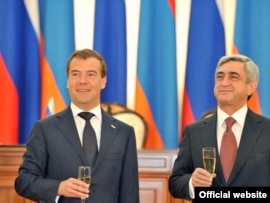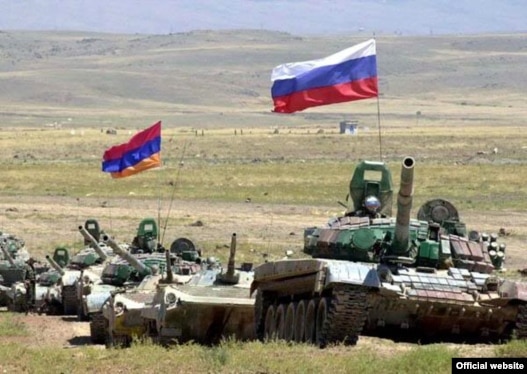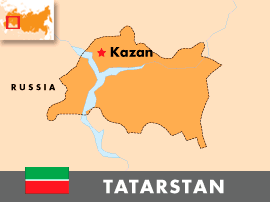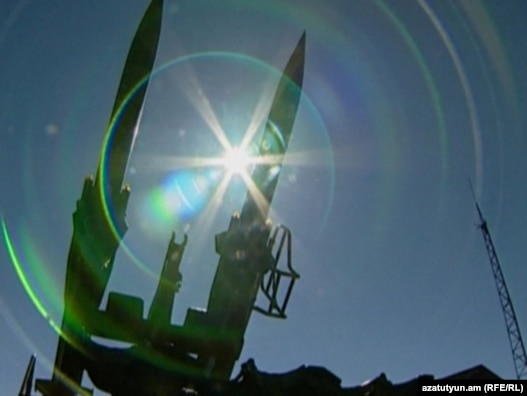Armenia and Russia have signed a raft of agreements, including a protocol that extends the lease of the Russian military base in the South Caucasus country for nearly a quarter of a century.
In the presence of the two countries’ leaders signatures to the document were put by Armenian Defense Minister Seyran Ohanian and his Russian counterpart Anatoly Serdyukov.
The defense pact, which is an upgrading of a 1995 treaty allowing Russian ground and air forces to be stationed in Armenia’s northwestern city of Gyumri near the border with Turkey, extends the Russian presence in the South Caucasus state from the initial 25 years to 49 years, that is, to 2044.
It also expands the Russian mission from protecting only the interests of the Russian Federation, to also ensuring the security of the Republic of Armenia and commits Moscow to supplying Armenia with modern and compatible weaponry and special military hardware.
The move is widely viewed in Armenia as a means to discourage neighboring Azerbaijan from committing aggression. Equally, it is likely to become a source of concern in Azerbaijan, which has an unresolved conflict with Armenia over Nagorno-Karabakh.
Ethnic Armenians in Nagorno-Karabakh fought a three-year secessionist war against Azerbaijan in the early 1990s. The currently disputed region has been de-facto independent since the 1994 ceasefire mediated by Russia. Moscow is also one of the three principal negotiators, along with Washington and Paris, in continuing talks between Armenia and Azerbaijan over Nagorno-Karabakh.
Speaking in Yerevan on Friday, President Medvedev said the protocol prolonging the treaty on the operation of Russia’s military base in Armenia is aimed

Armenia — President Serzh Sarkisian (R) and his Russian counterpart Dmitry Medvedev attend a ceremony of documents signing at the presidential palace in Yerevan, 20Aug2010
at “maintaining peace and security in the entire South Caucasus.”
Medvedev also stressed that peace in the region is “very important” to Russia and that Moscow remains loyal to its commitments as an ally of Armenia.
Responding to the media question about Russia’s possible reaction in the event of developments threatening the existence of the people of Nagorno-Karabakh, given the war rhetoric heard from Azerbaijan, Medvedev, in particular, said: “The task of the Russian Federation as a major state situated in the region, the most powerful state economically and militarily, is to maintain peace and order. But we also have our allied commitments that we have with members of the Collective Security Treaty Organization and the Republic of Armenia is a member of this organization… Russia treats its commitments as an ally very seriously.”
The Collective Security Treaty Organization (CSTO) groups Armenia, Belarus, Kazakhstan, Kyrgyzstan, Russia, Tajikistan, and Uzbekistan and calls for allied assistance should any of its members suffer aggression.
At the news conference Sarkisian praised the deal, which he said would expand the sphere of Russia’s “geographic and strategic” responsibilities, meaning that the base will not only be responsible for protecting the perimeter of the former Soviet Union border, i.e. with Iran and Turkey, but also beyond them.
“The Russian side has made a commitment to ensure the military security of the Republic of Armenia and to cooperate in equipping our armed forces with advanced weaponry,” Sarkisian said.
At the same time, Sarkisian stressed that Armenia continues to stand for a peaceful settlement of the Nagorno-Karabakh conflict “without application of force or threat of force.”
Sarkisian also thanked Medvedev for his mediatory efforts as well as for “understanding the meaning of the balance of forces in the region as an important factor of not allowing provocations and preventing militaristic ambitions.”

Armenia — Presidents of Armenia and Russia take part in the re-opening of 19th century Russian military cemetery, Gyumri, 20Aug2010
Medvedev, for his part, said he was ready to continue his mediatory efforts and work with both Azerbaijan and Armenia to help find a political solution “based on mutually acceptable agreements both within the general work of the OSCE Minsk Group and in bilateral contacts with Armenia and Azerbaijan.”
Analysts agree that the new deal with Armenia puts Russia on a stronger military footing in the South Caucasus where it also has bases in Georgia’s breakaway regions of South Ossetia and Abkhazia.
In Yerevan representatives of Armenia and Russia also signed four other documents, including an agreement concerning the construction of new energy units for Armenia’s ageing nuclear power plant.
In the afternoon Sarkisian and Medvedev attended a ceremony in Gyumri inaugurating the Hill of Honor, a restored Russian military cemetery founded in the 19th century as the final resting place for many Russian officers and soldiers killed in Russo-Turkish wars.
Later on August 20, the presidents of Armenia and Russia attended the opening of an informal summit of CSTO leaders hosted by Yerevan.




 Armenia — Armenian and Russian army units at a joint military exercise, undated
Armenia — Armenian and Russian army units at a joint military exercise, undated



 Armenia — Surface-to-air missiles at a military base in Gyumri, undated
Armenia — Surface-to-air missiles at a military base in Gyumri, undated

